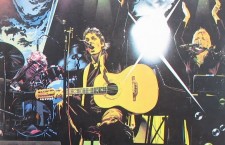Though more recent fare has been well received, there was once little Paul McCartney could do to quell the tide of vitriol from rock critics when it came to his solo work.
In fact, McCartney has issued a string of acclaimed releases beginning with 1997’s Flaming Pie, including 1999’s Run Devil Run, 2005’s Chaos and Creation in the Backyard, and 2008’s Electric Arguments with the Fireman. Even this year’s album of pre-rock standards, Kisses on the Bottom was given good marks.
At the same time, McCartney’s archive series has thrown new light on some of his more misunderstood legacy works. Ram, the 1971 album that just received a gala reissue treatment, is a great case in point: Viciously dismissed at the time by Rolling Stone magazine as “monumentally irrelevant,” the album has since been given a revised four-star review.
[SOMETHING ELSE! INTERVIEW: Henry McCullough talks about his time with Paul McCartney and Wings, Joe Cocker and the Grease Band — and how addiction almost cost him everything.]
The former Beatle, who turns 70 on Monday, June 18, 2012, takes it all in stride — certainly, the bad but also the good.
“It’s a bit suspicious, if you ask me,” McCartney joked, in a new talk with The Telegraph. “Look, people are allowed their own opinions and they don’t always coincide with yours. As an artist you just have to keep plugging on.”
He’s kept himself busy away from rock music, as well, recording six classical albums over the last 20 years, including 2011’s Ocean’s Kingdom. That has led, perhaps predictably, to some head scratching, as well.
“I know a lot of critics go ‘Why is he doing an orchestral thing, or a children’s song, what’s gone wrong with him?’ But this is my life, so I’m doing these things for me,” McCartney says. “If other people like them, I’m really happy, that is the ultimate. And if they don’t, well, you can’t please everyone.”
Here’s a look back at our recent thoughts on Paul McCartney and Wings. Click through the titles for complete reviews …
PAUL McCARTNEY – KISSES ON THE BOTTOM (2012): This is not just a love letter to a lost era of songmaking, but one of the most evocative, deeply ardent records that McCartney has ever issued. Working in a higher vocal range that remains largely untouched by age, or his rugged third-act touring schedule, the ex-Beatle stirs up a spectacular range of emotions: The hushed, crepuscular melancholy of Peter van Steeden’s “Home (When Shadows Fall)” is matched only by the stirring resolve found on Haywood Henry’s “Get Yourself Another Fool” from this now thrice-married soon-to-be-70-year-old. McCartney’s trembling rapture throughout Irving Berlin’s “Always” finds a balancing moment in his impish hat-tipping joy during Johnny Mercer’s “Ac-Cent-Thcu-Ate The Positive.”
PAUL McCARTNEY – McCARTNEY (1970)/McCARTNEY II (1980; 2011 reissues): Taken together, these albums show a willingness to strip down what had become a varnished sound. After all, Paul was coming off huge productions in the form of 1969’s Abbey Road with the Beatles and 1979’s Back to the Egg with Wings. But there is a broad disparity, more pronounced than ever, in how these recordings have aged. McCartney comes off as more organic, a simpler expression — like someone trying to work out his own sound. McCartney II was, truth be told, fatally hobbled from the first by Paul’s own poor mechanics with the synthesizers he chose to experiment with throughout.
ON SECOND THOUGHT: PAUL McCARTNEY AND WINGS – BACK TO THE EGG (1979): It’s time to go back and reevaluate Paul McCartney and Wings’ unjustly ignored Back to the Egg. Released in May 1979, the album showcased a rebuilt Wings lineup, with lead guitarist Laurence Juber working in sharp counterpoint to Denny Laine. Also on board was co-producer Chris Thomas, a former assistant to George Martin for the Beatles’ White Album who brought an edgier style to much of the project — in keeping with his concurrent work with the Sex Pistols and the Pretenders. McCartney’s stated goal, back then, was to make a raw-boned rock record. And he largely succeeded, putting a bright charge into his sound after the soft-rock fluff of 1978’s London Town.
PAUL McCARTNEY AND WINGS – BAND ON THE RUN (1973; 2010 reissue): A terrific reissue that reveals this anew as the most personal of McCartney recordings — though, even now, the album’s unifying theme of escape is more subtle (and thus more commercial) than the blunt confessional style of his former partner John Lennon. McCartney, instead, uses broader storytelling brushstrokes — skillfully weaving his own desire to break free of the Beatles with the age-old myths of ne’er-do-wells, hitchhikers and outsiders. No McCartney effort yet has taken so many chances, nor so successfully blended his interests in the melodic, the orchestral, the rocking and the episodic. In keeping, of the Beatles solo recordings, Band on the Run always sounded the most to me like something the old band might have put together.
[amazon_enhanced asin=”B002BSHWUU” container=”” container_class=”” price=”All” background_color=”FFFFFF” link_color=”000000″ text_color=”0000FF” /] [amazon_enhanced asin=”B00005BA03″ container=”” container_class=”” price=”All” background_color=”FFFFFF” link_color=”000000″ text_color=”0000FF” /] [amazon_enhanced asin=”B006RVDX00″ container=”” container_class=”” price=”All” background_color=”FFFFFF” link_color=”000000″ text_color=”0000FF” /] [amazon_enhanced asin=”B003PK4TZY” container=”” container_class=”” price=”All” background_color=”FFFFFF” link_color=”000000″ text_color=”0000FF” /] [amazon_enhanced asin=”B002BSHXJA” container=”” container_class=”” price=”All” background_color=”FFFFFF” link_color=”000000″ text_color=”0000FF” /]
- Ernesto Cervini’s Turboprop, “When I Fall” (2024): Video premiere - March 15, 2024
- Disaster Pony,“Dead Neon & The Noon Sun” from ‘Disaster Pony’ (2024): Video premiere - February 27, 2024
- Christopher Hoffman, “Farewell Forever” from ‘Vision Is The Identity’ (2024): Streaming premiere - February 19, 2024




